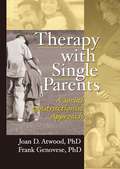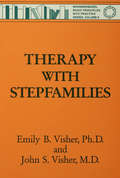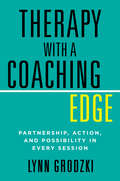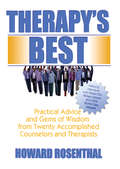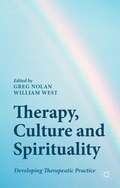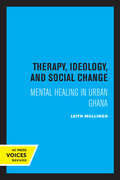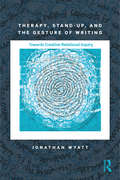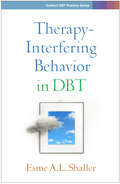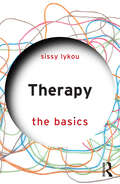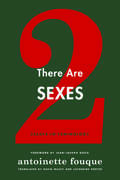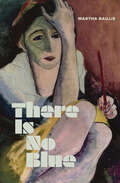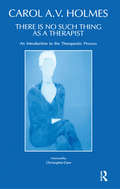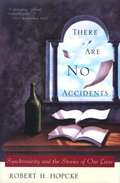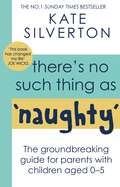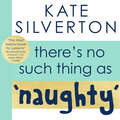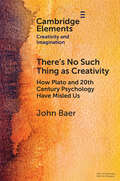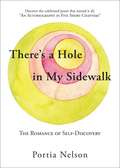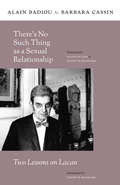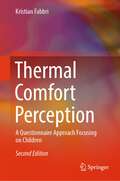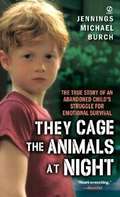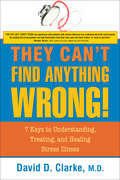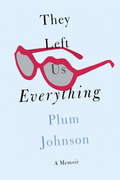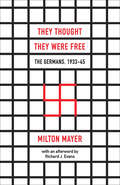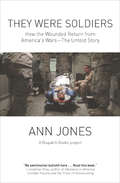- Table View
- List View
Therapy with Single Parents: A Social Constructionist Approach
by Joan D Atwood Frank GenoveseProvide effective counseling to members of single-parent familiesWith more than half of all first marriages ending in divorce, it&’s time to re-think the notion that "divorce" means "failure." Therapy with Single Parents focuses on the strengths of the single-parent family rather than its weaknesses, stressing the need to look at the socially constructed norms, values, and definitions associated with marriage and family in order to provide effective counseling. This unique book examines experiences that are common to single parents and presents interventive strategies for treating single-parent family issues, drawing on clinical case studies to provide technical knowledge in everyday language.Current research shows that single parents account for 27 percent of family households that include children under 18 and that the number of single mothers in the United States more than tripled between 1970 and 2000. Therapy with Single Parents challenges outdated notions that the single-parent family is somehow deficient and associated with adjustment problems in children. It doesn&’t ignore the anger, pain, sadness, and guilt experienced by many members of single parent families but offers therapeutic considerations from a more balanced approach. The book examines the social, psychological, and sexual experiences of newly single parents and addresses the ups and downs they&’ll face in dealing with schools, the workplace, and social services. Therapy with Single Parents examines: social and psychological differences between divorce and widowhood cognitive-behavioral principles of single-parent families what children can learn from divorce dealing with the ghosts of past relationships relationship rules dealing with adult children and extended families the effect of change in divorcing families the feminization of poverty the therapeutic value of social networksTherapy with Single Parents is an invaluable resource for psychologists, professional counselors, social workers, and marriage and family therapists. The book presents a thorough, in-depth examination of the single-parent family system as a viable, healthy family form.
Therapy with Stepfamilies
by Emily B. Visher John S. VisherFirst published in 1996. Routledge is an imprint of Taylor & Francis, an informa company.
Therapy with a Coaching Edge: Partnership, Action, And Possibility In Every Session
by Lynn GrodzkiBringing “coaching skills” to a therapy practice and clients. In Therapy with a Coaching Edge, professional practice guru Lynn Grodzki offers a new, paradigm-changing therapy model—adding the leverage and action of a coaching approach to the wisdom and goals of psychotherapy. This book presents a set of powerful coaching strategies that have been adapted and designed specifically for therapy—to provide more reach and range for therapists and counselors while not requiring a wholesale abandonment of therapeutic principles. Using this model, therapists at all levels of experience can promote behavioral change without insisting on homework or rigid protocols. Clients can spot results in each and every therapy session. Resistance to treatment often softens and client retention improves. Grodzki gives new and veteran clinicians the skills to not only improve client outcomes, but also energize themselves as practitioners. Therapists feel empowered as they learn to ask compelling questions that generate "ah-ha" moments. They help clients go beyond a discussion of symptoms to explore topics of core values. They show clients how to make decisions based on both necessity and a vision of a better future. The model provides readers with just-in-time learning, to identify a skill when it is needed an then immediately apply the steps in a session. Grodzki, an expert psychotherapist and master certified coach, has proven herself to be a trusted voice for therapists through her writing and workshops; she makes the steps to using a coaching approach understandable by offering lively case examples, "your turn" exercises, and sample scripts to give her readers the confidence and context to move forward.
Therapy's Best: Practical Advice and Gems of Wisdom from Twenty Accomplished Counselors and Therapists
by Howard RosenthalInsightful interviews with a Who&’s Who of the world&’s foremost therapistsTherapy&’s Best is a lively and entertaining collection of one-on-one interviews with some of the top therapists and counselors in the world. Educator and psychotherapist Dr. Howard G. Rosenthal talks with twenty of therapy&’s legends, including Albert Ellis, arguably the greatest clinical psychologist and therapist of our time; assertiveness training pioneer Robert Alberti; experiential psychotherapist Al Mahrer; and William Glasser, the father of reality therapy and choice theory. Each interview reveals insights into the therapists&’ personal lives, their observations on counseling, and the helping profession in general, and their thoughts on what really works when dealing with clients in need. The interviews found in Therapy&’s Best uncover treatment strategies that are often missing from traditional textbooks, journal articles, courses, and seminars related to assertiveness training, Rational Emotive Behavior Therapy (REBT), marriage and family counseling, transactional analysis, psychoanalysis, suicide prevention, voice therapy, experiential psychotherapy, and Emotion Focused Therapy (EFT). Conversations with the "best and brightest" (including two recipients of the American Psychological Association&’s Division of Psychotherapy&’s "Living Legends" award) reveal why these therapists are such effective helpers, what makes their theories so popular, and most important, what makes them tick. This unique book lets you "rub elbows" with these consummate professionals and learn more about their theories, ideas, and experiences. Therapy&’s Best includes interviews with: Dr. Albert Ellis-creator of Rational Emotive Behavior Therapy (REBT) and APA Division of Psychotherapy "Living Legend" Dr. Edwin Schneidman-the foremost expert on suicide prevention, suicidology, and thanatology Richard Nelson Bolles-author of What Color Is Your Parachute? Dr. Dorothy and Dr. Ray Bevcar-husband and wife therapists who write textbooks on marriage counseling Dr. Al Mahrer-father of experiential psychotherapy and APA Division of Psychotherapy "Living Legend" Les Greenberg-father of Emotion-Focused Therapy (EFT) Muriel James-co-author of Born to Win and many more!Therapy&’s Best is a must read for professionals who practice counseling and psychotherapy, students preparing to do likewise, and anyone else with an interest in therapy-and the people with provide it.
Therapy, Culture and Spirituality
by Greg Nolan William WestThis edited collection addresses how therapy can engage with issues of race, culture, religion and spirituality. It is a response to the need for practitioners to further their understanding and skills base in developing ways of appropriately responding to the interconnectivity of these evolving issues.
Therapy, Ideology, and Social Change: Mental Healing in Urban Ghana (Comparative Studies of Health Systems and Medical Care)
by Leith MullingsThis title is part of UC Press's Voices Revived program, which commemorates University of California Press’s mission to seek out and cultivate the brightest minds and give them voice, reach, and impact. Drawing on a backlist dating to 1893, Voices Revived makes high-quality, peer-reviewed scholarship accessible once again using print-on-demand technology. This title was originally published in 1984.
Therapy, Stand-Up, and the Gesture of Writing: Towards Creative-Relational Inquiry (Writing Lives: Ethnographic Narratives)
by Jonathan WyattTherapy, Stand-Up, and the Gesture of Writing is a sharp, lively exploration of the connections between therapy, stand-up comedy, and writing as a method of inquiry; and of how these connections can be theorized through the author’s new concept: creative-relational inquiry. Engaging, often poignant, stories combine with rich scholarship to offer the reader provocative, original insights. Wyatt writes about his work as a therapist with his client, Karl, as they meet and talk together. He tells stories of his experiences attending comedy shows in Edinburgh and of his own occasional performances. He brings alive the everyday profound through vignettes and poems of work, travel, visiting his mother, mourning his late father, and more. The book’s drive, however, is in bringing together therapy, stand-up, and writing as a method of inquiry to mobilise theory, drawing in particular from Deleuze and Guattari, the new materialisms, and affect theory. Through this diffractive work, the text formulates and develops creative-relational inquiry. With its combination of fluent story-telling and smart, theoretical propositions, Therapy, Stand-up, and the Gesture of Writing offers compelling possibilities both for qualitative scholars who have an interest in narrative, performative, and embodied scholarship, and those who desire to bring current, complex, theories to bear upon their research practices.
Therapy-Interfering Behavior in DBT (Guilford DBT Practice Series)
by Esme A. ShallerTherapy-interfering behavior (TIB) is a key treatment target in dialectical behavior therapy (DBT), second only to suicidal thinking and self-harm. This wise, engaging book gives clinicians everything they need to assess, understand, and address TIB both in clients and in themselves. Therapists learn how to orient clients to TIB and work with it effectively whenever it shows up, using a combination of validation, contingency management, and dialectics. Packed with clinical examples, dialogues, and practical tips, the book discusses the full range of DBT contexts, from individual therapy to skills class, phone coaching, and consultation teams.
Therapy: The Basics (The Basics)
by sissy lykouTherapy: The Basics is an introductory book to psychotherapy and its different theoretical approaches. It attempts to demystify and de-stigmatise therapy by answering some common questions posed by prospective clients.lykou presents an accessible overview of psychotherapy and counselling, mapping a variety of the most popular approaches from psychoanalysis and cognitive behavious therapy to embodied and creative therapies, whilst giving an overview of the roots of psychotherapy in traditional and indigenous healing methods. The book also acknowledges criticisms of current approaches, with their neo-liberal heteronormative Eurocentric perspective, and considers where therapy stands in today’s globalised world. The book's structure allows different umbrella theories and their developments to be explored separately but also in relation to one another.This book is essential reading for trainees, a useful reference for qualified therapists who want to deepen their knowledge, a supporting resource for prospective psychotherapy clients, and a companion for readers who simply want to expand their horizons.
There Are Two Sexes: Essays in Feminology
by Antoinette FouqueAntoinette Fouque cofounded the Mouvement de Libération des Femmes (MLF) in France in 1968 and spearheaded its celebrated Psychanalyse et Politique, a research group that informed the cultural and intellectual heart of French feminism. Rather than reject Freud's discoveries on the pretext of their phallocentrism, Fouque sought to enrich his thought by more clearly defining the difference between the sexes and affirming the existence of a female libido. By recognizing women's contribution to humanity, Fouque hoped "uterus envy," which she saw as the mainspring of misogyny, could finally give way to gratitude and by associating procreation with women's liberation she advanced the goal of a parity-based society in which men and women could write a new human contract. The essays, lectures, and dialogues in this volume finally allow English-speaking readers to access the breadth of Fouque's creativity and activism. Touching on issues in history and biography, politics and psychoanalysis, Fouque recounts her experiences running the first women's publishing house in Europe; supporting women under threat, such as Aung San Suu Kyi, Taslima Nasrin, and Nawal El Saadaoui; and serving as deputy in the European Parliament. Her theoretical explorations discuss the ongoing development of feminology, a field she initiated, and, while she celebrates the progress women have made over the past four decades, she also warns against the trends of counterliberation: the feminization of poverty, the persistence of sexual violence, and the rise of religious fundamentalism.
There Is No Blue
by Martha BaillieTHE GLOBE AND MAIL: BOOKS TO READ IN FALL 2023Martha Baillie’s richly layered response to her mother’s passing, her father's life, and her sister’s suicide is an exploration of how the body, the rooms we inhabit, and our languages offer the psyche a home, if only for a time. Three essays, three deaths. The first is the death of the author’s mother, a protracted disappearance, leaving space for thoughtfulness and ritual: the washing of her body, the making of a death mask. The second considers the author’s father, his remoteness, his charm, a lacuna at the centre of the family even before his death, earlier than her mother’s. And then, the shocking death of the author’s sister, a visual artist and writer living with a diagnosis of schizophrenia, who writes three reasons to die on her bedroom wall and then takes her life."Martha Baillie’s novels are thrillingly, joyously singular, that rare combination of sui generis and just plain generous. That There Is No Blue, her memoir, is all of those things too, is no surprise; still, she has gone somewhere extraordinary. This triptych of essays, which exquisitely unfolds the “disobedient tale” of the lives and deaths of her mother, her father, and her sister, is a meditation on the mystery and wonder of grief and art making and home and memory itself. It made me think of kintsugi, the Japanese art of repair, in which the mending is not hidden but featured and beautifully illuminated. Baillie’s variety of attention, carved out of language, is tenderness, is love." – Maud Casey, author of City of Incurable Women"This is a stunning memoir, intense and meticulous in its observations of family life. Baillie subtly interrogates and conveys the devastating mistranslations that take place in childhood, the antagonism and porousness of siblings, and the tragedy of schizophrenia as it unfolds. I couldn’t put it down." – Dr. Lisa Appignanesi, author of Mad, Bad and Sad and Everyday Madness"Exquisite." – Souvankham Thammavongsa, author of How to Pronounce Knife"I am grateful for this profound meditation on family and loss.” – Charlie Kaufman, filmmaker"This strange, unsettling memoir of outer life and inner life and their bizarre twining captures the author’s identity by way of her mother’s death, her sister’s failing battle with mental illness, and the mysterious figure of her father. It combines anguished guilt, deep tenderness, and bemused affection in highly evocative, often disturbing prose. Its brave honesty is amplified by a persistent lyricism; its undercurrent of fear is uplifted by a surprising, resilient hopefulness. It is both a plea for exoneration and an act of exoneration, an authentic meditation on the terrible difficulty of being human." – Andrew Solomon, author of The Noonday Demon
There Is No Such Thing As A Therapist: An Introduction to the Therapeutic Process
by Carol HolmesThis book deals with the link between the purpose of therapy and the boundaries of the therapeutic situation, which - the author argues - derive from the omnipresence of the anxiety surrounding separations and death. The theoretical framework of this book is part of a developmental line from Freud, Klein and Winnicott to Langs, via Sartre and Buber.
There are no Accidents
by Robert H. HopckeAn informal examination of Jung's theory of synchronoicity through the telling of stories.
There's No Such Thing As 'Naughty': The groundbreaking guide for parents with children aged 0-5: THE #1 SUNDAY TIMES BESTSELLER
by Kate SilvertonTHE #1 SUNDAY TIMES BESTSELLER'This book has changed my life' Joe Wicks'As a parenting support book this is in a class of its own . . . It is perhaps the most helpful book for parents of children of any age' Professor Peter Fonagy, CEO Anna Freud National Centre for Children & Families'This is a book that will change lives' Dr Suzanne Zeedyk, Infant Psychologist'This book is absolutely brilliant! I love that it is about parenting a healthy brain' Dr Guddi Singh, Paediatrician and Health CampaignerWant to know the secret to tackling tantrums and tears, stopping squabbles in seconds AND lay the foundations for your child's good mental health in the process? In There's No Such Thing As 'Naughty', mum to two young children, journalist and children's mental health advocate Kate Silverton shares her groundbreaking new approach to parenting under-fives that helps to make family life so much easier and and certainly a lot more fun!Kate's unique strategies, easy-to-follow scripts and simple techniques will enable you to manage those tricky everyday challenges with ease - and help you to enjoy the strongest bond possible with your child, both now and in the years ahead. Endorsed by leading figures in the field of children's mental health, at the heart of the book is a simple and revelatory way to understand how your child's brain develops and how it influences their behaviour. Rooted in the latest science - explained really simply - this engaging, accessible and warm parenting guide will redefine how you see and raise your children, with a new understanding that for under-fives, there can be no such thing as 'naughty'.
There's No Such Thing As 'Naughty': The groundbreaking guide for parents with children aged 0-5: THE #1 SUNDAY TIMES BESTSELLER
by Kate SilvertonTHE #1 SUNDAY TIMES BESTSELLER'This book has changed my life' Joe Wicks'As a parenting support book this is in a class of its own . . . It is perhaps the most helpful book for parents of children of any age' Professor Peter Fonagy, CEO Anna Freud National Centre for Children & Families'This is a book that will change lives' Dr Suzanne Zeedyk, Infant Psychologist'This book is absolutely brilliant! I love that it is about parenting a healthy brain' Dr Guddi Singh, Paediatrician and Health CampaignerWant to know the secret to tackling tantrums and tears, stopping squabbles in seconds AND lay the foundations for your child's good mental health in the process? In There's No Such Thing As 'Naughty', mum to two young children, journalist and children's mental health advocate Kate Silverton shares her groundbreaking new approach to parenting under-fives that helps to make family life so much easier and and certainly a lot more fun!Kate's unique strategies, easy-to-follow scripts and simple techniques will enable you to manage those tricky everyday challenges with ease - and help you to enjoy the strongest bond possible with your child, both now and in the years ahead. Endorsed by leading figures in the field of children's mental health, at the heart of the book is a simple and revelatory way to understand how your child's brain develops and how it influences their behaviour. Rooted in the latest science - explained really simply - this engaging, accessible and warm parenting guide will redefine how you see and raise your children, with a new understanding that for under-fives, there can be no such thing as 'naughty'.
There's No Such Thing As 'Naughty': The groundbreaking guide for parents with children aged 0-5: THE #1 SUNDAY TIMES BESTSELLER
by Kate SilvertonTHE #1 SUNDAY TIMES BESTSELLER'This book has changed my life' Joe Wicks'As a parenting support book this is in a class of its own . . . It is perhaps the most helpful book for parents of children of any age' Professor Peter Fonagy, CEO Anna Freud National Centre for Children & Families'This is a book that will change lives' Dr Suzanne Zeedyk, Infant Psychologist'This book is absolutely brilliant! I love that it is about parenting a healthy brain' Dr Guddi Singh, Paediatrician and Health CampaignerWant to know the secret to tackling tantrums and tears, stopping squabbles in seconds AND lay the foundations for your child's good mental health in the process? In There's No Such Thing As 'Naughty', mum to two young children, journalist and children's mental health advocate Kate Silverton shares her groundbreaking new approach to parenting under-fives that helps to make family life so much easier and and certainly a lot more fun!Kate's unique strategies, easy-to-follow scripts and simple techniques will enable you to manage those tricky everyday challenges with ease - and help you to enjoy the strongest bond possible with your child, both now and in the years ahead. Endorsed by leading figures in the field of children's mental health, at the heart of the book is a simple and revelatory way to understand how your child's brain develops and how it influences their behaviour. Rooted in the latest science - explained really simply - this engaging, accessible and warm parenting guide will redefine how you see and raise your children, with a new understanding that for under-fives, there can be no such thing as 'naughty'.
There's No Such Thing as Creativity: How Plato and 20th Century Psychology Have Misled Us (Elements in Creativity and Imagination)
by John BaerMost people (including creativity researchers) act as if they believe that creativity is not simply a useful category or label but a real thing with its own essence (just as Plato would argue that an ideal triangle has an essence that is shared with all actual triangles). Most people (including creativity researchers) also believe that there is a set of general creativity-relevant skills that can be applied to most problems in ways that will lead to more creative outcomes. Creativity research now calls these beliefs into question. A domain-general misunderstanding of the nature of creativity-relevant skills and the equally mistaken belief that creativity exists independently of actual creative things and ideas have together hindered creativity theory, research, assessment, and training. A more domain-specific and nominalist understanding of creativity will free creativity researchers to make progress in areas where it is currently stymied.
There's a Hole in My Sidewalk: The Romance of Self-Discovery
by Portia NelsonTHE ROMANCE OF SELF-DISCOVERY This classic, well-loved guide to life is warm, wise, and funny. Portia Nelson's book and her poem "Autobiography in Five Short Chapters" have been embraced by individuals, therapy groups, and self-help programs around the world.
There’s No Such Thing as a Sexual Relationship: Two Lessons on Lacan (Insurrections: Critical Studies in Religion, Politics, and Culture)
by Barbara Cassin Alain BadiouPublished in 1973, "L'Etourdit" was one of the French philosopher Jacques Lacan's most important works. The book posed questions that traversed the entire body of Lacan's psychoanalytical explorations, including his famous idea that "there is no such thing as a sexual relationship," which seeks to undermine our certainties about intimacy and reality. In There's No Such Thing as a Sexual Relationship, Alain Badiou and Barbara Cassin take possession of Lacan's short text, thinking "with" Lacan about his propositions and what kinds of questions they raise in relation to knowledge. Cassin considers the relationship of the real to language through a Sophist lens, while the Platonist Badiou unpacks philosophical claims about truth. Each of their contributions echoes back to one another, offering new ways of thinking about Lacan, his seminal ideas, and his role in advancing philosophical thought.
Thermal Comfort Perception: A Questionnaire Approach Focusing on Children (Springerbriefs In Applied Sciences And Technology Ser.)
by Kristian FabbriThis book offers a comprehensive exploration of children's understanding and experiences of thermal comfort. The book provides a methodology for evaluating comfort that takes into account the unique perspectives of children. The first part of the book provides an overview of the history of thermal comfort, the human body and environmental parameters, and common thermal comfort indexes. It also offers guidelines for creating questionnaires that accurately assess children's perceptions of indoor thermal comfort. The book then delves into children's understanding of the concepts of comfort and energy, as well as the factors that influence their perception of these concepts. It addresses the psychological and pedagogical aspects of thermal comfort judgment, as well as the architectural and environmental characteristics that contribute to children's perceptions of comfort. First published as Indoor Thermal Comfort Perception, this updated edition also includes new sections on architecture and sensitivity, exploring the impact of classroom spaces on learning, and outdoor education and thermal comfort outdoors, based on qualitative research. These additions provide valuable insights for future studies on these topics. While physical parameter measurements and comfort indexes are useful in thermal comfort, the book emphasizes the importance of ergonomic assessments in the form of questionnaires, which offer unique insights into children's experiences. The book fills a critical gap in understanding children's perceptions of thermal comfort and is essential reading for HVAC engineers, architects, environmental psychologists, and researchers in the medical and cognitive fields.
They Cage the Animals At Night: The True Story of a Child Who Learned to Survive
by Jennings Michael BurchAn autobiography of a boy who learned to reach out for love despite being left in an orphanage and growing up in many foster homes.
They Can't Find Anything Wrong: 7 Keys to Understanding, Treating, and Healing Stress Illness
by David D. ClarkeA specialist in Stress Illness reveals how to identify and remedy this potentially serious health issue that too often goes undiagnosed. Every year, millions of people seek medical care for symptoms that diagnostic tests are unable to explain. Sent away frustrated, or thinking it&’s &“all in their heads,&” the truth is that many of these people are ill because of hidden stresses. Dr. David Clarke has done pioneering work with thousands of these patients, often sent to him as a last resort. In They Can&’t Find Anything Wrong, he offers real solutions to put a stop to the stress illness epidemic. Dr. Clarke describes the major types of stress and explains steps for treatment with a range of effective techniques. Case histories that read like medical mysteries illustrate the concepts and make them easy to apply.
They Left Us Everything: A Memoir
by Plum JohnsonA warm, heartfelt memoir of family, loss, and a house jam-packed with decades of goods and memories. After almost twenty years of caring for elderly parents--first for their senile father, and then for their cantankerous ninety-three-year old mother--author Plum Johnson and her three younger brothers have finally fallen to their middle-aged knees with conflicted feelings of grief and relief. Now they must empty and sell the beloved family home, twenty-three rooms bulging with history, antiques, and oxygen tanks. Plum thought: How tough will that be? I know how to buy garbage bags.But the task turns out to be much harder and more rewarding than she ever imagined. Items from childhood trigger difficult memories of her eccentric family growing up in the 1950s and '60s, but unearthing new facts about her parents helps her reconcile those relationships, with a more accepting perspective about who they were and what they valued.They Left Us Everything is a funny, touching memoir about the importance of preserving family history to make sense of the past, and nurturing family bonds to safeguard the future.From the Hardcover edition.
They Thought They Were Free: The Germans, 1933–45
by Richard J. Evans Milton Mayer“When this book was first published it received some attention from the critics but none at all from the public. Nazism was finished in the bunker in Berlin and its death warrant signed on the bench at Nuremberg.” That’s Milton Mayer, writing in a foreword to the 1966 edition of They Thought They Were Free. He’s right about the critics: the book was a finalist for the National Book Award in 1956. General readers may have been slower to take notice, but over time they did—what we’ve seen over decades is that any time people, across the political spectrum, start to feel that freedom is threatened, the book experiences a ripple of word-of-mouth interest. And that interest has never been more prominent or potent than what we’ve seen in the past year. Mayer, an American journalist of German descent, traveled to Germany in 1935 in attempt to secure an interview with Hitler. He failed, but what he saw in Berlin chilled him. He quickly determined that Hitler wasn’t the person he needed to talk to after all. Nazism, he realized, truly was a mass movement; he needed to talk with the average German. He found ten, and his discussions with them of Nazism, the rise of the Reich, and mass complicity with evil became the backbone of this book, an indictment of the ordinary German that is all the more powerful for its refusal to let the rest of us pretend that our moment, our society, our country are fundamentally immune. A new foreword to this edition by eminent historian of the Reich Richard J. Evans puts the book in historical and contemporary context. We live in an age of fervid politics and hyperbolic rhetoric. They Thought They Were Free cuts through that, revealing instead the slow, quiet accretions of change, complicity, and abdication of moral authority that quietly mark the rise of evil.
They Were Soldiers: How the Wounded Return from America's Wars (Dispatch Books)
by Ann Jones&“Unsparing, scathingly direct, and gut-wrenching . . . the war Washington doesn&’t want you to see&” (Andrew J. Bacevich, New York Times–bestselling author of Washington Rules) This &“uncompromisingly visceral&” account (Mother Jones) of what combat does to American soldiers comes from a veteran journalist who was embedded with troops in Afghanistan and reveals the harrowing journeys of the wounded, from the battlefield to back home. Along the way, the author of the acclaimed Kabul in Winter shows us the dead, wounded, mutilated, brain-damaged, drug-addicted, suicidal, and homicidal casualties of our distant wars, exploring the devastating toll such conflicts have taken on us as a nation. &“An indispensable book about America&’s current wars and the multiple ways they continue to wound not only the soldiers but their families and indeed the country itself. Jones writes with passion and clarity about the tragedies other reporters avoid and evade.&” —Marilyn Young, editor of Iraq and the Lessons of Vietnam
